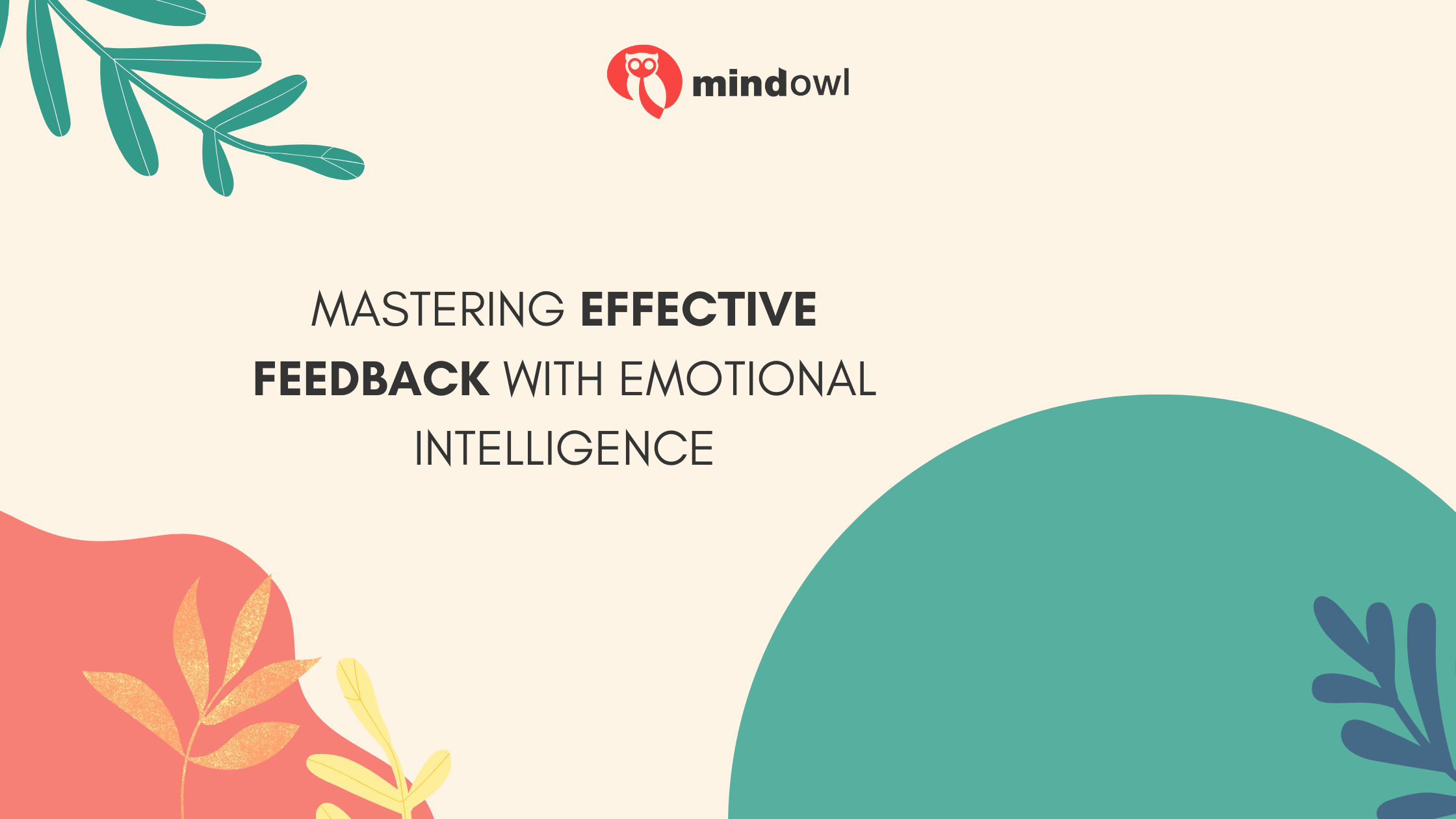Have you ever experienced a time when giving or receiving feedback didn’t go as expected? You’re not alone. Many find the process complex, particularly when attempting to maintain its constructiveness and lead to optimistic results.
Here’s a fascinating fact: emotional intelligence considerably influences how we react to and handle feedback.
This article will discuss mastering beneficial feedback using emotional intelligence. We will address why your perception of emotions is significant during opinion exchanges and how it can transform complicated dialogues into chances for development.
Understanding Emotional Intelligence
Understanding Emotional Intelligence involves acknowledging and handling emotions, both in oneself and others. It plays a vital role in effective communication, teamwork, and leadership within various professional environments.
Definition and Importance
Emotional intelligence refers to an individual’s ability to discern and manage personal emotions while also comprehending and impacting the emotions of others. This skill is a key determinant of the quality of our interactions, relationship development, and decision-making processes.
It comprises empathy, self-awareness, motivation, social acumen and self-regulation, each enhancing our feedback mechanisms’ effectiveness.
The value of emotional intelligence in feedback exchanges is significant. It paves the way for productive criticism that catalyses both personal and professional advancement. Giving feedback with exceptional emotional intelligence fosters trust amongst individuals by demonstrating acknowledgement and respect for their emotions.
Consequently, feedback sessions are transformed into avenues for perpetual enhancement instead of being sources of tension or dispute.
Connection with Feedback
The role of emotional intelligence in the way we impart and accept feedback effectively is substantial. Having a higher degree of emotional intelligence means being aware of your own emotions and those of others when conveying or accepting details about performance.
This ability enhances the feedback process beyond mere information exchange, transforming it into a potent instrument for personal and professional development. For example, a leader who can sense the mood of their team can sculpt their constructive critique in a manner that fosters trust rather than apprehension.
Imparting feedback with emotional intelligence comprises empathy, patience, and precision. It demands identifying the emotional condition of the recipient and modifying your message to suit it, promoting a proper understanding of the intended meaning.
The influence is not just in the content but also in the delivery method. Proficient communicators employ this method to present their feedback as a chance for ongoing improvement rather than an attack.
The primary objectives of feedback should be to encourage growth and cultivate relationships.

Key Principles of Giving Feedback with Emotional Intelligence
When providing feedback with emotional intelligence, place emphasis on empathy and self-awareness to establish a strong emotional connection with the recipient. Make certain that your feedback is precise and actionable to offer clear direction for enhancement.
Empathy and Self-Awareness
Empathy plays a pivotal role in providing feedback with emotional intelligence. This skill involves gaining an understanding of the feelings and perspectives of others, which in turn allows us to provide constructive criticism in a manner that promotes growth and development.
For instance, rather than simply saying “You did this wrong,” an approach filled with empathy might be, “I understand your objective here. Perhaps we could utilise this method next time.” This subtle shift not only engenders trust but also promotes open dialogue.
Being self-aware is also essential when handling feedback discussions. This requires identifying our own emotions and potential triggers during these engagements. Comprehending our emotional status assists in controlling our reactions when both providing and receiving feedback.
If we recognise that negative feedback causes us to become defensive, we can ensure we are ready to listen more openly before providing a rejoinder. This self-understanding is a potent instrument for both personal and professional development, as it encourages a more considered approach to each piece of feedback shared.
Specificity and Actionability
Specificity and actionability transform feedback from broad suggestions into powerful tools for growth. Telling someone to “improve their presentation skills” lacks clarity. Contrastingly, advising them to incorporate more visual aids and rehearse aloud offers clear direction.
This approach not only makes the path forward evident but also builds trust between the giver and receiver of feedback.
Empowering individuals with actionable feedback requires exact examples tied to observable behaviours or outcomes. For instance, rather than stating an employee needs to enhance team communication, specifying that they should send weekly updates via email provides a concrete strategy they can implement immediately.
This method supports continuous improvement processes by constructively focusing on personal development areas, framing feedback as an opportunity for professional advancement rather than criticism.
Strategies for Receiving Feedback Effectively
To receive feedback effectively, actively listen to the giver’s perspective without interrupting, and seek clarification when necessary. Manage emotional responses by staying open-minded and acknowledging personal feelings before responding.
Listening Actively
Listening actively is a key skill in receiving feedback with emotional intelligence. You need to fully focus on the person speaking, not just hear their words but also understand their emotions and thoughts.
This means putting aside your reactions and judgements while they talk. Paying close attention shows you value their feedback and are open to it, even if it’s tough to hear.
Practice active listening by acknowledging what you’re hearing without immediately responding.
Active listeners use body language like nodding to show they are engaged. They also ask questions for clarity, showing they want to understand everything fully. This approach builds trust between people and makes the process of giving and receiving feedback more effective.
By managing your own emotions during this time, you create a safe space for honest conversations that can lead to growth and improvement.
Managing Emotional Responses
Managing emotional responses is key when we receive feedback with emotional intelligence. It helps us grow personally and professionally. Here’s how to do it effectively:
- Focus on your breath. When you start feeling upset, take deep breaths to calm down.
- Recognise your feelings. Identifying emotions like anger or shame makes them easier to manage.
- Pause before answering. This gives you time to think and not just react.
- Think about the intent behind the feedback. Most times, it’s meant to help, not hurt.
- Ask for examples if the feedback isn’t clear. This can reduce confusion and stress.
- Talk about your feelings if you’re comfortable doing so. Sharing can build trust between you and the person giving feedback.
- Practise gratitude for receiving feedback, even if it’s tough. It shows a commitment to continual improvement.
- Reflect on the feedback later when you’re calmer. You might see it in a new light.
- Decide on one action you can take based on the feedback to improve yourself or your work situation.
- Put a plan in place to act on that decision and track your progress over time.
Challenges in Feedback Processes
Handling challenging feedback, particularly when addressing sensitive or difficult topics, can present obstacles. Balancing positive and constructive criticism is demanding, but it’s essential to manage emotional responses and deliver feedback with empathy. This approach fosters constructive conversations while navigating potential discomfort or resistance.
Handling Difficult Feedback
Receiving hard-to-swallow feedback is a trial of your emotional intelligence aptitudes. One must keep their emotions in check and stay open to the discussion. This calls for a sturdy level of self-belief and conviction.
The procedure turns smoother when one sees every feedback as a growth opportunity, even when it’s initially tough to digest.
Faith holds a cardinal position in this situation. Building faith with the individual offering feedback paves the way for more truthful conversations. It also diminishes tension and stress, simplifying the task of addressing areas that require enhancement.
Retaining emotional stability is fundamental when you offer or accept challenging feedback within any repertoire of communication abilities.
Balancing Positive and Negative Feedback
Balancing constructive and encouraging feedback is pivotal in nurturing an environment for growth and development. It involves recognising the strengths of an individual or team while also addressing areas that require enhancement.
By offering specific examples and practical suggestions for improvement, this approach ensures that recipients feel appreciated for their contributions while also receiving clear guidance on how to improve their performance.
To achieve this equilibrium, feedback providers should customise their feedback to the individual’s emotional state, ensuring empathy and social skills are utilised in every interaction.
This recognition of emotions during feedback conversations helps maintain emotional equilibrium, fostering an open environment where individuals are open to both encouraging and improvement-oriented feedback as a valuable tool for personal and professional development.
Conclusion
In conclusion, mastering effective feedback with emotional intelligence is vital for personal and professional growth. By integrating emotional intelligence skills into feedback processes, individuals can create a supportive environment that nurtures continual improvement.
Receiving feedback with empathy and managing emotional responses are fundamental principles in developing emotionally intelligent feedback practices. Embracing feedback as a valuable tool for mutual growth can lead to transformative power in both personal and professional realms.
In today’s competitive digital world, the ability to give and receive feedback effectively is vital for building trust, enhancing communication skills, and promoting psychological resilience.
Therefore, harnessing the power of emotional intelligence in feedback processes holds immense potential for unlocking opportunities for growth and development.
MindOwl Founder – My own struggles in life have led me to this path of understanding the human condition. I graduated with a bachelor’s degree in philosophy before completing a master’s degree in psychology at Regent’s University London. I then completed a postgraduate diploma in philosophical counselling before being trained in ACT (Acceptance and commitment therapy).
I’ve spent the last eight years studying the encounter of meditative practices with modern psychology.

